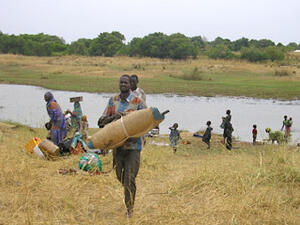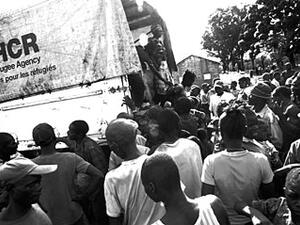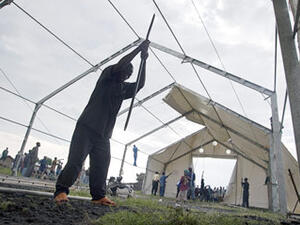Returns from Democratic Republic of the Congo to Rwanda increase
Returns from Democratic Republic of the Congo to Rwanda increase
Increasing numbers of Rwandan civilians in the eastern Democratic Republic of the Congo (DRC) are approaching UNHCR for assistance in repatriating. They fear the new escalation of violence sparked by the launch of a joint Rwandan/DRC offensive against the rebel group, Democratic Forces for the Liberation of Rwanda (FDLR), in late January.
In the first six weeks of this year, UNHCR assisted the return of 3,000 Rwandans from eastern DRC. In comparison, during all of 2008, some 8,000 Rwandans returned voluntarily to their homes in Rwanda. We expect the return of thousands more Rwandan civilians, some of whom fled to the DRC after the Rwandan genocide in 1994.
The Rwandans approaching our offices in North and South Kivu provinces in eastern DRC are mainly women and children. They say that they are returning home willingly. Most of these people spent almost 15 years in eastern DRC and in many places they integrated with the local Congolese communities.
Some say they were told by their leaders it is time to return home. Others say they feared being caught in crossfire. They also fear reprisals by the FDLR rebels. Many said their host Congolese families had run out of resources and were asking them to return to their country.
Generally, those who approach us for assistance in repatriation appear to be in good health, although visibly tired after long walks and truck journeys from UNHCR assembly points in North and South Kivu. UNHCR has increased its fleet of trucks and has set up seven assembly points in North Kivu and six in South Kivu. Here, the returning Rwandans wait to be transported to the repatriation transit centres where they receive an assistance package consisting of a one-month food ration and various other aid items. We are expanding the capacities of the transit centres.
Former FDLR combatants wanting repatriation are presenting themselves to the UN peacekeeping mission MONUC that is also responsible for their disarmament, demobilisation, repatriation, reinsertion, and reintegration.
Meanwhile, a steady flow of Congolese refugees is crossing into Uganda from the DRC's troubled North Kivu province. With some 180 new arrivals every day in Kisoro and Kanungu districts, UNHCR Uganda registered nearly 7,000 new Congolese refugees since the beginning of the year. According to latest estimates, some 47,000 Congolese refugees have crossed into Uganda since the new fighting broke out in North Kivu August last year
Together with Ugandan authorities, our teams at the border receive the new arrivals, register them and provide hot meals, medical services, and aid items. They are then transferred to other settlements further inside Uganda. After Nakivale refugee settlement reached its capacity of 42,200 refugees in January, the Ugandan government designated Kyangwali as the next settlement area for the newly arrived Congolese refugees. Kyangwali, an old refugee settlement with a holding capacity of 23,000, now has 15,100 refugees (9,400 Congolese and 5,700 Sudanese). We plan two relocation convoys every week.
Most of the new arrivals from the DRC are women and children who fled from Buganza, Nyamirima and Ishasha areas in the North Kivu province. The UNHCR operation in Uganda assists more than 155,000 refugees. Most of them are from the neighbouring DRC, Sudan and Rwanda. There are also refugees from Somalia, Burundi, Eritrea and Ethiopia.








